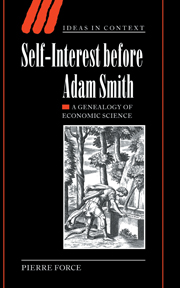Book contents
Introduction
Published online by Cambridge University Press: 22 September 2009
Summary
In an eloquent formula manifesting the reverence economists have for the founder of their discipline, George Stigler characterizes Adam Smith's Wealth of Nations as “a stupendous palace erected upon the granite of self-interest.” The meaning of the metaphor is clear. Self-interest provides a rock-solid foundation for the theory developed in The Wealth of Nations. Furthermore, since Adam Smith's work is itself the foundation of modern economic science, self-interest is the first principle of economics. Because self-interest is a concept of such fundamental importance, one would expect Adam Smith to mention it quite often. Yet the term “self-interest” is remarkably rare in The Wealth of Nations. It appears only once, in the context of a discussion of religion. Smith explains that in the Catholic Church, “the industry and zeal of the inferior clergy are kept more alive by the powerful motive of self-interest than perhaps in any established Protestant church.” Catholic priests work harder than the established Protestant clergy because, instead of being salaried, they depend upon voluntary gifts from their parishioners. In the famous passage analyzing the motives “the butcher, the brewer, or the baker” may have for providing our dinner, Smith does not refer to self-interest but rather to self-love: “We address ourselves, not to their humanity but to their self-love, and never talk to them of our own necessities but of their advantages.” One may be tempted to brush the difference aside, and argue that self-love and self-interest are synonyms.
- Type
- Chapter
- Information
- Self-Interest before Adam SmithA Genealogy of Economic Science, pp. 1 - 6Publisher: Cambridge University PressPrint publication year: 2003

